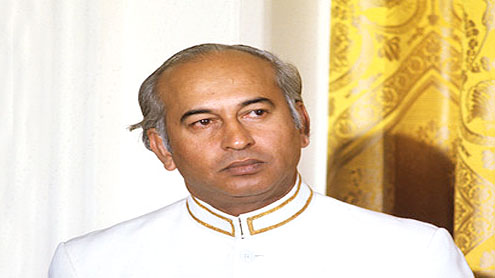 Interior Minister Rehman Malik briefed PPP Chairman Bilawal Bhutto Zardari and Co-chairman President Asif Ali Zardari on the investigation report into Benazir Bhutto’s murder on the death anniversary of Zulfikar Ali Bhutto (ZAB) on January 5 in Naudero, but stopped short of making it public. The stated reason is that a premature release could compromise progress in the case. Even last year, the public was left high and dry when the report was not presented on Benazir Bhutto’s death anniversary on December 27, despite an announcement by the party. The sensitivity of the matter notwithstanding, the PPP must keep in mind that the longer it takes to bring all the perpetrators to justice and informs the public of what exactly happened and who was responsible, the more there will be disappointment and disillusionment, not only amongst the public at large but even amongst the PPP’s own members. Three years is a very long time for an investigative report to have been completed.
Interior Minister Rehman Malik briefed PPP Chairman Bilawal Bhutto Zardari and Co-chairman President Asif Ali Zardari on the investigation report into Benazir Bhutto’s murder on the death anniversary of Zulfikar Ali Bhutto (ZAB) on January 5 in Naudero, but stopped short of making it public. The stated reason is that a premature release could compromise progress in the case. Even last year, the public was left high and dry when the report was not presented on Benazir Bhutto’s death anniversary on December 27, despite an announcement by the party. The sensitivity of the matter notwithstanding, the PPP must keep in mind that the longer it takes to bring all the perpetrators to justice and informs the public of what exactly happened and who was responsible, the more there will be disappointment and disillusionment, not only amongst the public at large but even amongst the PPP’s own members. Three years is a very long time for an investigative report to have been completed.
The other highlight of ZAB’s death anniversary was a reference filed by President Asif Ali Zardari in the Supreme Court for reopening the case of the ‘judicial murder’ of Bhutto. Contrary to all the negative speculations that it is merely a move to embarrass the judiciary, the PPP stance that they want to rectify a historic wrong has merit, so that Bhutto’s place in history is redeemed. The footnote on his life is that he was hanged for a murder. It is now a matter of record that the judges hearing this case were under immense pressure, as has been admitted by Justice (retired) Nasim Hassan Shah. Legal experts argue that the law of the land suggests that the actual perpetrators of the murder and those accused of complicity or approval are to be dealt with differently. Even if, for the sake of argument, it could have been proved beyond reasonable doubt through a free, fair, transparent and impartial judicial process that Mr Bhutto had approved the murder of Ahmad Raza Kasuri, for which he was handed down the death sentence by the Lahore High Court, subsequently upheld on appeal by the Supreme Court of Pakistan, the appropriate sentence should have been that of life imprisonment, not death. But since the judicial process itself was biased, not only at the High Court level, but also the Supreme Court, his guilt or innocence remains to be proved. The redemption that the PPP aspires to for its founding leader is not only a matter of correcting a historical wrong, it is also actually the first in what should be a long series of steps the PPP should have taken whenever it was in power to correct past wrongs.












